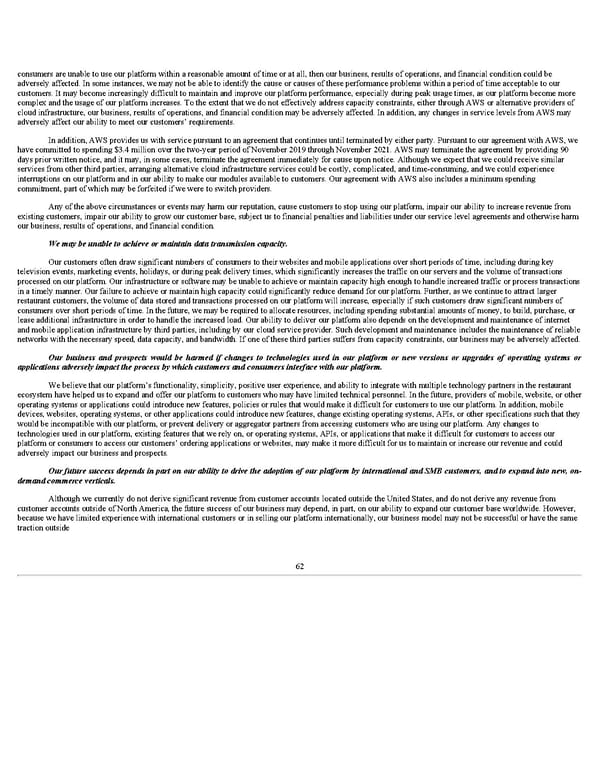consumers are unable to use our platform within a reasonable amount of time or at all, then our business, results of operations, and financial condition could be adversely affected. In some instances, we may not be able to identify the cause or causes of these performance problems within a period of time acceptable to our customers. It may become increasingly difficult to maintain and improve our platform performance, especially during peak usage times, as our platform become more complex and the usage of our platform increases. To the extent that we do not effectively address capacity constraints, either through AWS or alternative providers of cloud infrastructure, our business, results of operations, and financial condition may be adversely affected. In addition, any changes in service levels from AWS may adversely affect our ability to meet our customers’ requirements. In addition, AWS provides us with service pursuant to an agreement that continues until terminated by either party. Pursuant to our agreement with AWS, we have committed to spending $3.4 million over the two-year period of November 2019 through November 2021. AWS may terminate the agreement by providing 90 days prior written notice, and it may, in some cases, terminate the agreement immediately for cause upon notice. Although we expect that we could receive similar services from other third parties, arranging alternative cloud infrastructure services could be costly, complicated, and time-consuming, and we could experience interruptions on our platform and in our ability to make our modules available to customers. Our agreement with AWS also includes a minimum spending commitment, part of which may be forfeited if we were to switch providers. Any of the above circumstances or events may harm our reputation, cause customers to stop using our platform, impair our ability to increase revenue from existing customers, impair our ability to grow our customer base, subject us to financial penalties and liabilities under our service level agreements and otherwise harm our business, results of operations, and financial condition. We may be unable to achieve or maintain data transmission capacity. Our customers often draw significant numbers of consumers to their websites and mobile applications over short periods of time, including during key television events, marketing events, holidays, or during peak delivery times, which significantly increases the traffic on our servers and the volume of transactions processed on our platform. Our infrastructure or software may be unable to achieve or maintain capacity high enough to handle increased traffic or process transactions in a timely manner. Our failure to achieve or maintain high capacity could significantly reduce demand for our platform. Further, as we continue to attract larger restaurant customers, the volume of data stored and transactions processed on our platform will increase, especially if such customers draw significant numbers of consumers over short periods of time. In the future, we may be required to allocate resources, including spending substantial amounts of money, to build, purchase, or lease additional infrastructure in order to handle the increased load. Our ability to deliver our platform also depends on the development and maintenance of internet and mobile application infrastructure by third parties, including by our cloud service provider. Such development and maintenance includes the maintenance of reliable networks with the necessary speed, data capacity, and bandwidth. If one of these third parties suffers from capacity constraints, our business may be adversely affected. Our business and prospects would be harmed if changes to technologies used in our platform or new versions or upgrades of operating systems or applications adversely impact the process by which customers and consumers interface with our platform. We believe that our platform’s functionality, simplicity, positive user experience, and ability to integrate with multiple technology partners in the restaurant ecosystem have helped us to expand and offer our platform to customers who may have limited technical personnel. In the future, providers of mobile, website, or other operating systems or applications could introduce new features, policies or rules that would make it difficult for customers to use our platform. In addition, mobile devices, websites, operating systems, or other applications could introduce new features, change existing operating systems, APIs, or other specifications such that they would be incompatible with our platform, or prevent delivery or aggregator partners from accessing customers who are using our platform. Any changes to technologies used in our platform, existing features that we rely on, or operating systems, APIs, or applications that make it difficult for customers to access our platform or consumers to access our customers’ ordering applications or websites, may make it more difficult for us to maintain or increase our revenue and could adversely impact our business and prospects. Our future success depends in part on our ability to drive the adoption of our platform by international and SMB customers, and to expand into new, on- demand commerce verticals. Although we currently do not derive significant revenue from customer accounts located outside the United States, and do not derive any revenue from customer accounts outside of North America, the future success of our business may depend, in part, on our ability to expand our customer base worldwide. However, because we have limited experience with international customers or in selling our platform internationally, our business model may not be successful or have the same traction outside 62
 Q3 2021 10Q Page 67 Page 69
Q3 2021 10Q Page 67 Page 69